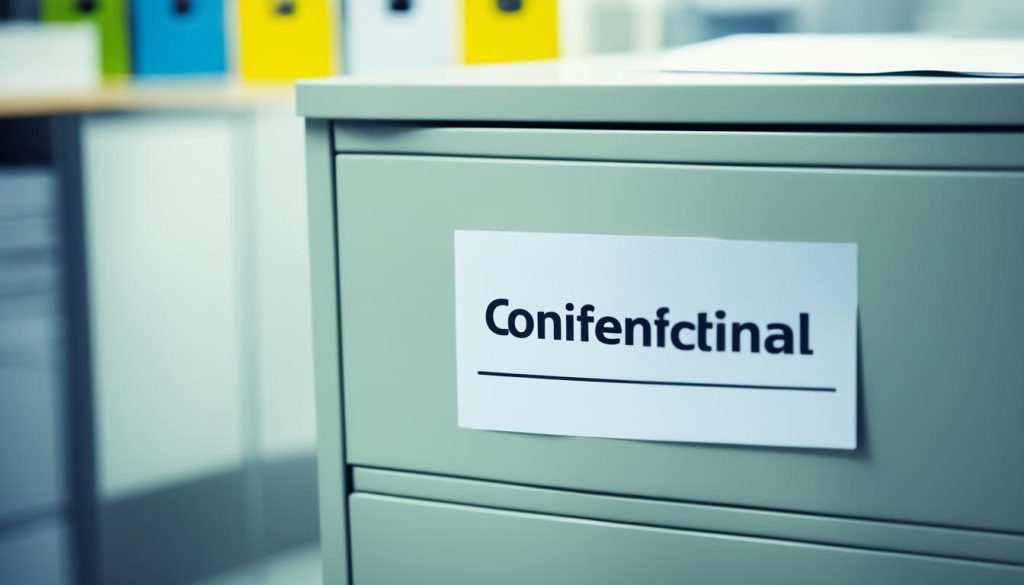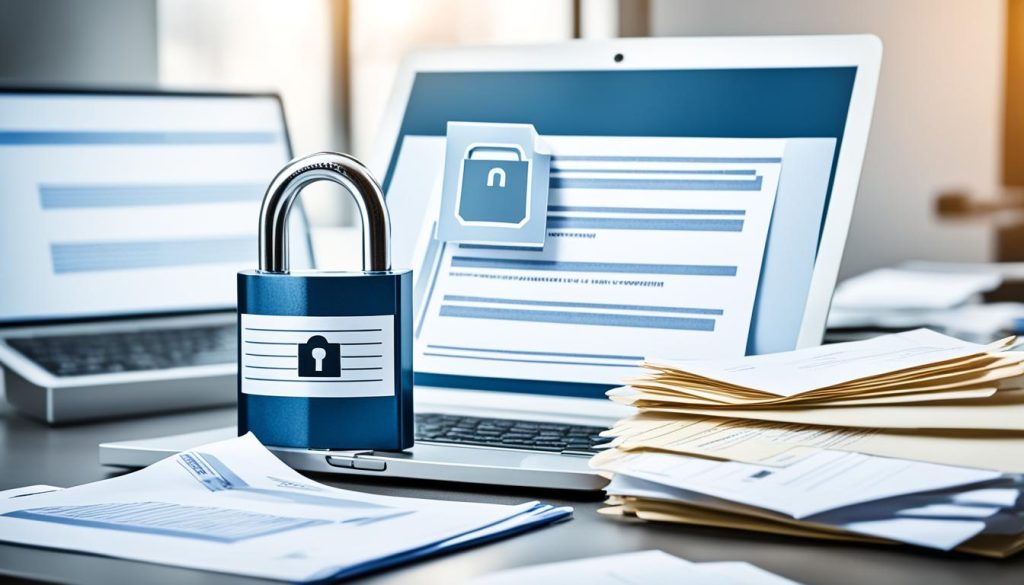What is a Breach of Confidentiality?
A breach of confidentiality refers to the unauthorized disclosure of private information to a third party without the owner’s consent. It can happen to individuals, businesses, or organizations, and can involve personal data, business plans, financial information, or intellectual property. The consequences of a breach can be legal, financial, and reputational. Legal implications may involve liabilities for damages and prosecution under data protection/GDPR legislation. Financially, legal actions can be costly and may result in lost business opportunities. A breach can also damage a business’s reputation, affecting trust, relationships, and recommendations.
To avoid a breach of confidentiality, it is important to understand and safeguard the confidential information you possess, limit access to sensitive data, improve training on confidentiality, and use contract law and encryption to protect the information.
Examples of Breach of Confidentiality
Breaches of confidentiality can occur in various ways. It is important to understand the examples of breach of confidentiality to prevent them and mitigate their consequences. Some common examples include:
- Accidentally sharing sensitive information with the wrong client or a third party, such as mistakenly sending an email with confidential information to the wrong recipient.
- Theft or loss of a company device containing sensitive client data, compromising personal data security.
- Sharing confidential information with unauthorized individuals, including family or friends, leading to a breach of confidentiality.
- Discussing confidential information in public or open areas where it can be overheard, risking information leaks and privacy violations.
- Leaking news of redundancies or bankruptcies before official announcements are made, potentially causing financial losses and reputational damage.
These breaches can result in financial losses, legal actions, and reputational damage. Protecting confidential information and implementing robust data security measures is crucial to prevent these breaches and maintain trust with clients, customers, and employees.
Real-Life Example of a Breach of Confidentiality:
A notable example of a breach of confidentiality is the 2018 Facebook-Cambridge Analytica scandal. It involved the unauthorized collection and misuse of personal data from millions of Facebook users without their explicit consent. This breach highlighted the importance of safeguarding personal data and the significant impact that a breach can have on individuals’ privacy and trust.

The Importance of Confidentiality in the Workplace
Confidentiality is a critical aspect of any workplace, irrespective of its nature. It plays a significant role in maintaining trust and integrity with clients, customers, and employees. Failure to uphold confidentiality can result in breaches of trust, contract terminations, legal actions, and reputational damage to the business.
Confidentiality acts as the foundation for successful business relationships, future collaborations and recommendations. Businesses must implement policies and measures to safeguard confidential information and prevent privacy violations. This includes:
- Training employees on the importance of confidentiality and the proper handling of sensitive information.
- Using non-disclosure agreements to legally bind individuals to maintain confidentiality.
- Limiting access to sensitive data to authorized personnel only.
- Implementing password protection and encryption methods to safeguard digital information.

By prioritizing confidentiality, businesses can strengthen trust, maintain positive relationships with stakeholders, and protect their reputation. It demonstrates a commitment to ethical conduct and instills confidence in clients and customers.
Next, we will explore real-life examples of breaches of confidentiality, illustrating the potential consequences and highlighting the importance of effective information security.
Dealing with a Breach of Confidentiality
If a breach of confidentiality occurs, it is important to take immediate action. The consequences of a data protection breach or violation of privacy can be significant, resulting in legal and financial implications. In order to protect confidential information, it is essential to understand how to deal with breach of confidentiality effectively.
Steps to Handle a Breach of Confidentiality
The following steps can help to mitigate the impact of a breach and protect confidential information:
- Be honest and transparent: Admit the mistake and openly acknowledge the potential consequences of the breach. Honesty and transparency are key in rebuilding trust.
- Notify the individuals and authorities: Depending on the severity of the breach, it may be necessary to inform the affected individuals, clients, customers, or relevant authorities. Compliance with data protection regulations is vital.
- Consult legal representatives and experts: Seek guidance from legal representatives and experts experienced in handling breaches of confidentiality. They can provide valuable advice on the legal implications and necessary steps towards resolution.
- Review and update policies: Evaluate existing confidentiality policies and procedures and make necessary updates to prevent future breaches. This includes enhancing employee training on confidentiality and reinforcing the importance of protecting confidential information.
- Implement additional safeguards: Consider implementing additional measures to protect confidential information, such as encryption, password protection, and secure storage systems.
By following these steps, businesses and individuals can minimize the damage caused by a breach of confidentiality, safeguard confidential information, and maintain trust and integrity with clients and stakeholders.

An Example of a Breach Response Plan
To provide a clear understanding of how to respond to a breach of confidentiality, here is an example of a breach response plan:
| Step | Action |
|---|---|
| 1 | Immediately assess the severity of the breach and identify the affected individuals or parties. |
| 2 | Notify the individuals or parties impacted by the breach, providing them with relevant information about the incident and actions being taken to address it. |
| 3 | Engage legal counsel to determine the legal obligations and assess potential liabilities. |
| 4 | Conduct a thorough investigation to identify the root cause of the breach and implement corrective measures to prevent similar incidents in the future. |
| 5 | Review and update security protocols, privacy policies, and employee training programs to enhance protection of confidential information. |
By having a breach response plan in place, businesses can handle breaches of confidentiality effectively and minimize the impact on their operations and reputation.
Conclusion
Ensuring the maintenance of confidentiality is vital for individuals and businesses alike. Breaches of confidentiality can result in significant legal, financial, and reputational repercussions. It is crucial to have a clear understanding of what constitutes a breach of confidentiality, be aware of potential examples of breaches, and recognize the importance of confidentiality in the workplace.
Taking proactive measures to protect confidential information is key in preventing breaches. This includes implementing robust policies, providing comprehensive training to employees, restricting access to sensitive data, and utilizing effective safeguards such as encryption and password protection. By adopting these measures, individuals and businesses can significantly reduce the risk of a security breach or a personal data breach.
In the unfortunate event of a breach, it is imperative to promptly address the issue with honesty and transparency. Admitting the mistake and acknowledging the potential consequences demonstrate a commitment to rectify the situation. Complying with legal obligations, such as data protection regulations, may require notifying affected individuals, clients, or relevant authorities. Seeking guidance from legal professionals can provide invaluable support in navigating the legal implications and taking the necessary steps towards resolution.
By actively prioritizing confidentiality and handling breaches responsibly, individuals and businesses can minimize damages and restore trust and integrity. Confidentiality should always be treated as a fundamental aspect of any operation, enabling individuals and businesses to thrive while preserving privacy and security.





